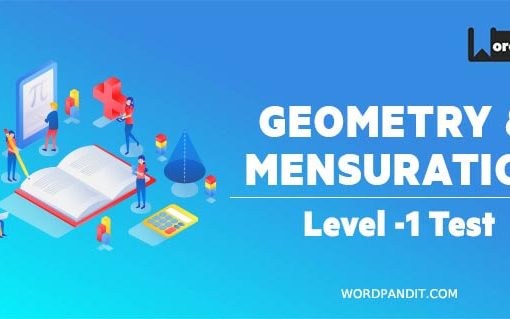- This is an assessment test.
- To draw maximum benefit, study the concepts for the topic concerned.
- Kindly take the tests in this series with a pre-defined schedule.
Geometry and Mensuration: Level 1 Test 9
Congratulations - you have completed Geometry and Mensuration: Level 1 Test 9.You scored %%SCORE%% out of %%TOTAL%%.You correct answer percentage: %%PERCENTAGE%% .Your performance has been rated as %%RATING%%
Your answers are highlighted below.
Question 1 |
The number of bricks, each measuring 25 cm x 12.5 cm x 7.5 cm, required to construct a wall 6 m long, 5 m high and 0.5 m thick, while the mortar occupies 5% of the volume of the wall, is
5740 | |
6080 | |
3040 | |
8120 |
Question 1 Explanation:
$ \displaystyle Total\text{ }number\text{ }of\text{ }bricks\text{ }required\text{ }=\frac{600\times 500\times 50\times 0.95}{25\times 12.5\times 7.5}=6080$
Question 2 |
A and B travel around a circular path at uniform speeds in opposite directions, starting from diametrically opposite points, at the same time. They meet each other first after B has travelled 100 metres and meet again 60 metres before A completed one round. The circumference of the park is
240 m | |
300 m | |
320 m | |
480 m |
Question 2 Explanation:
 Let A travel x m in the first meeting and thus the ratio of speeds of A and B is x/100.
Let A travel x m in the first meeting and thus the ratio of speeds of A and B is x/100.Total circumference = 2(x+100) as they were diametrically opposite.
In the 2nd meeting A has travelled 2x+200-60 = 2x+140.
B has travelled = 100+x+60 = 160+x,
Ratio of speed A:B = 2x+140/160+x
Equating the two ratios we will get,
x= 140.
Thus the circumference = 2X140+200 = 480 m
Question 3 |
If the radius of circle is increased by 50%, then the area of the circle is increased by
125% | |
100% | |
75% | |
50% |
Question 3 Explanation:
Area is directly proportional to r2
=> Area is directly proportional to (1.5 r2)
=> Area is directly proportional to 2.25r
The area has increased by (2.25 -1)x100 = 125%
=> Area is directly proportional to (1.5 r2)
=> Area is directly proportional to 2.25r
The area has increased by (2.25 -1)x100 = 125%
Question 4 |
Four sheets 50 cm x 5 cm are arranged without overlapping to form a square having side 55 cm. What is the area of inner square so formed?
2500 cm2 | |
2025 cm2 | |
1600 cm2 | |
None of these |
Question 4 Explanation:
The side of the inner square = 55 – 2 x 5 = 45 cm = 55 -2X5 = 45 cm.
The area of the inner square = 452 =2025 cm2
The area of the inner square = 452 =2025 cm2
Question 5 |
A photo measures 0.9 x cm by 0.94 x cm. It is to be enlarged so that the larger dimension will be 6 cm. The length of the enlarged shorter dimension will be
5.74x cm | |
5.4x cm | |
5.64x cm | |
7.09x cm |
Question 5 Explanation:
$latex \displaystyle The\text{ }required\text{ }length=\frac{0.9\times 6}{0.94}=5.74$
Once you are finished, click the button below. Any items you have not completed will be marked incorrect.
There are 5 questions to complete.
List |













